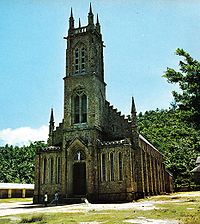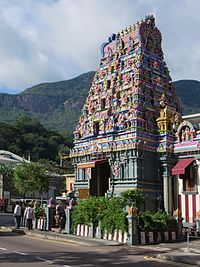Religion in Seychelles


Christianity is the largest religion in Seychelles with around 89.2% of its population following it. A majority of them are Roman Catholic (76%) followed by Anglicans (6%). Hinduism is the largest minority and the largest non-Christian with 2.4% of its population following it.[2] Other Christian groups include Baptists, Seventh-day Adventists, Assemblies of God, the Pentecostal Church, the Pentecostal Assembly, Nazarites, Eastern Orthodox Church and Jehovah's Witnesses.[2] Islam, Baháʼí Faith and Buddhism also have sizeable number of adherents in the country.[2]
The initial settlers in Seychelles were Roman Catholics, and the country has remained so, despite ineffective British efforts to establish Protestantism in the islands during the nineteenth century.[3] The nation has been a bishopric since 1890, and mission schools had a virtual monopoly on education until the government took over such schools in 1944.[3] Sunday masses are well attended, and religious holidays are celebrated throughout the nation both as opportunities for the devout to practice their faith and as social events.[3] Practicing Catholicism, like speaking French, historically conferred a certain status by associating its adherents with the settlers from France.[3]
Approximately 6% of Seychellois are Anglicans,[2] most coming from families converted by missionaries in the late 19th and early 20th century.[3] Evangelical Protestant churches are active and growing, among them Pentecostals and Seventh-day Adventists.[3] Some 5.1% of the population are adherents of other faiths, including Hinduism 2.4%, Islam 1.6%, the Baháʼí Faith and others non-Christian 1.1%.[2] A Hindu temple and mosque exist on Mahé.[citation needed] No restrictions are imposed on religious worship by any of the denominations,[3] and tax-free status is granted by the government.[citation needed]
Although the clergy and the civil authorities disapprove, many Seychellois see little inconsistency between their orthodox religious observance and belief in magic, witchcraft, and sorcery.[3] It is not uncommon to consult a local seer—known as a bonom di bwa—for fortune-telling or to obtain protective amulets or charms, called gri-gri, to bring harm to enemies.[3]
See also[]
- Hinduism in Seychelles
- Islam in Seychelles
- Roman Catholicism in Seychelles
References[]
- ^ "Archived copy" (PDF). Archived from the original (PDF) on 2014-05-14. Retrieved 2015-04-26.
{{cite web}}: CS1 maint: archived copy as title (link) - ^ a b c d e Seychelles
- ^ a b c d e f g h i Tartter, Jean R. (1995). "Seychelles: Religion". In Metz, Helen Chapin (ed.). Indian Ocean: five island countries (3rd ed.). Washington, D.C.: Federal Research Division, Library of Congress. pp. 220–221. ISBN 0-8444-0857-3. OCLC 32508646.
 This article incorporates text from this source, which is in the public domain.
This article incorporates text from this source, which is in the public domain.{{cite encyclopedia}}: CS1 maint: postscript (link)
- Religion in Seychelles
- Seychelles stubs
